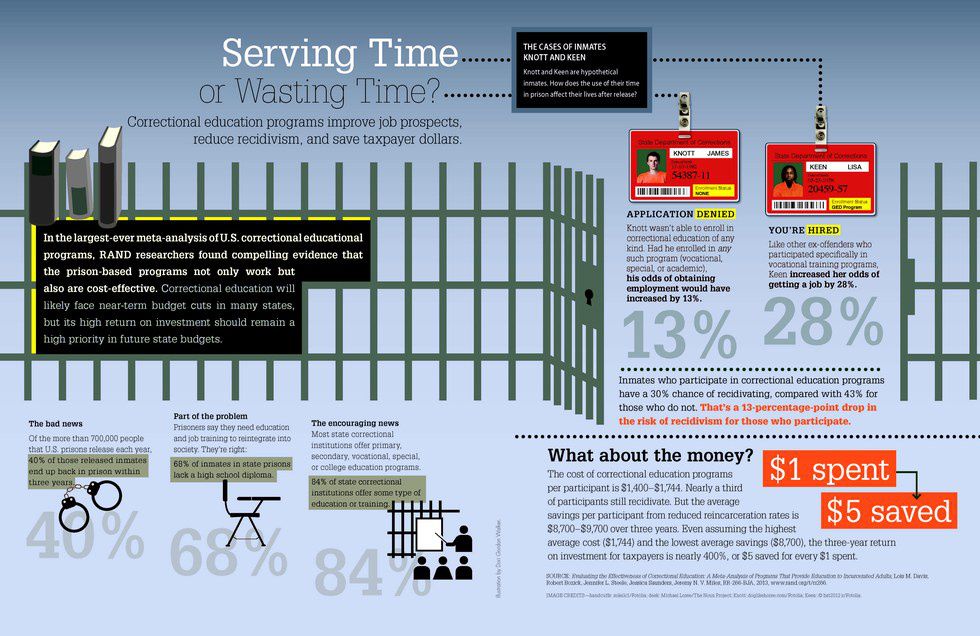RICHMOND, Va. (VCU Odyssey) -- Education is a fundamental tool within the criminal justice community that is being integrated in jails and prisons to ultimately reduce recidivism rates and grant inmates marketable skills once they are released.
According to a 2013 study by the RAND Corporation, “correctional education improves inmates’ chances of not returning to prison.”
The same study found that investing $1 into educational and vocational programs decreases correctional costs by $4 to $5 within three years of release. A Bureau of Justice Statistics study on recidivism between 2005 and 2010 states that 75 percent of ex-offenders recidivate within three years of release.
This infographic visually details RAND Corporation's study on educational programs and its effect on recidivism rates.
Since 2010, the Virginia Commonwealth University “Open Minds” program utilizes education to assist residents at the Richmond City Justice Center with their transition back into the community.
Open Minds began at the old Richmond City Jail, and is now under the guise of RCJC’s internal program, “Recovering from Everyday Addictive Lifestyles” or REAL.
“Can you write your way out of one life to another?” said Dr. David Coogan, a VCU English professor and co-director who teaches the Open Minds writing course. “Writing is important to give vulnerable people perspective on life.”
Open Minds began in 2010 after receiving a $13,000 grant from VCU’s Division of Community Engagement. In the course, residents at RCJC are given the opportunity to take six weeks of a collegiate course. According to Internal Program Director Dr. Sarah Scarbrough, residents must read and write at a ninth grade level.
More education equals less recidivism, Coogan said. He said although individually the class cannot fix the national problem, Open Minds is allowing VCU students the opportunity to study alongside those with different experiences.
A typical Open Minds course meets at the justice center; students and RCJC residents intermingle and sit at tables set up in a large circle. The current semester writing course worked on an assignment entitled “The Gift of Words.”
Coogan said he chose the assignment because it gives the class the “power and agency to work in collaboration.”
Students plotted a story outline including the setting, characters, and major themes. Then, they would pass along the outline to whomever is next to them to begin the story. The story continued to be passed along to other students to finish until class concluded.
“It gives me an opportunity to write what hasn’t been said,” said George, an RCJC resident participating in the course.
In order to participate in Open Minds, students must apply with an essay stating why they are interested.
“It definitely changes your perception of education,” Sarah Velasco-Kent, a VCU freshman and Open Minds student, said. “It’s not a charity; we don’t come in to make ourselves feel good. You’re in a room full of completely different intellects. It’s one of the most vital programs I’ve ever been a part of.”
Taneasha White, another VCU student and Open Minds participant, said the program helps “break down stereotypes.”
“One thing I like to stress when people ask me what this class is that it’s not a GED class,” she said. “We’re taking it together [with the residents].”
A study by the Institute of Higher Education Policy stated that the role of education helps reduce recidivism because it offers more accessibility to marketable skills for those seeking to reenter the workforce after release.
Megan Rollins, president and CEO of Boaz & Ruth, a non-profit reentry program based in Highland Park, said education and access to opportunity are key in assisting the transition from incarceration to freedom.
“I’m not sure I’ve ever met someone who wants to go back to incarceration,” Rollins said.
Boaz & Ruth utilizes education and job training to provide those returning from incarceration with marketable skills.
“We have this American myth that people pull themselves up by their bootstraps,” she said. “There’s an unwillingness to recognize that those boots and those bootstraps are education and access to opportunity.
“When you don’t have boots and you don’t have bootstraps, it’s an abstract thought to say, ‘Make it on your own.’ Sure, you can do that, but it’s a lot harder to do that without support and community.”





















